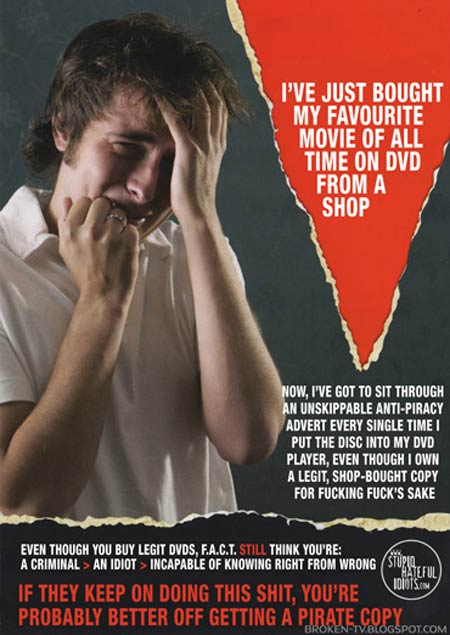I dream of a cultural market that includes its customers, instead of suing them.
So far, I have published a couple of books and a certain amount of articles and book chapters: a fair share of them have been put online for readers to download them for free. I didn’t do it, “pirates” did. Well, sometimes Google Books did it, but pirates benefited from it, I guess… Point is: I thank them, because that helped my books being republished and made my articles known to a wider audience.
Just my two cents, but I believe people who freely download online contents are not stealing it. On the contrary, by sharing it within their communities, they are actively adding value to the creative process. I write books. Readers read it. So-called Internet pirates promote, distribute, link, localise, remix, comment and catalogue them. That’s a heck of a job. A job they are not paid for. Ironically, they pay for sharing: they pay hardware and they contribute their time, their disk space and their technical competences.
Given that, I’m all the more insulted by the anti-piracy bill recently proposed by French Minister for Culture and Communication, Christine Albanel.

Should this law pass, Internet users caught “illegally” sharing contents would have their Internet access cut out for one year (plus face fines and other legal ramifications). Backed by record industry and cinema lobbies, this law is not only politically reactionary – it is technically unfeasible. If only French lawmakers had heard about public internet access, wi-fi, cybercafés, cloud computing – they would know “individual” Internet access is just about as individual as the wall socket one plugs a washing machine in. You bar it off, I can simply go somewhere else.
Consumer associations and Internet access providers have produced a number of other compelling arguments against this law. My only argument is:
Present legislation on so-called intellectual property protection on the Web mimics past century’s legislation on private property. Users downloading mp3, films, software are equated to petty thieves stealing apples, cars, money. But a car and an mp3 file are not the same kind of product. Technically, the former is a rivalrous good, while the latter is a non-rivalrous one. If I’m driving a car, nobody else can at the same time. If I listen to an mp3, anybody else can at that same time. In the first case, we can talk about stealing. In the second case, we should talk about sharing. From a legal and economic point of view, online contents are more similar to public goods than to private ones. Downloading online contents is nothing like driving a car: it is more like riding a bus. The French government is doing something as ridiculous as forbidding public transportation.
This is why I invite you to take part to the Download day that will take place all around France on Sat, March 28th, 2009. The rationale is explained here, and here is the twitter providing directions and details about the venues.
—a